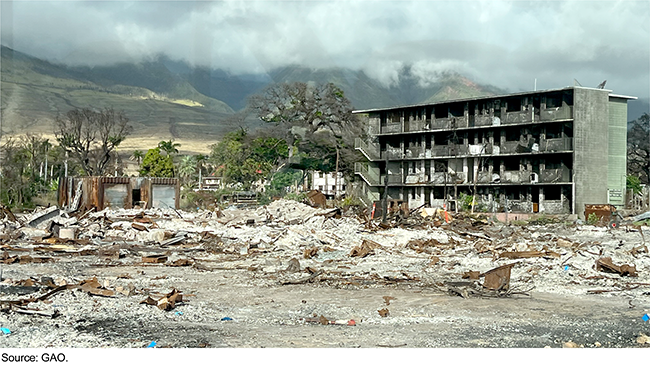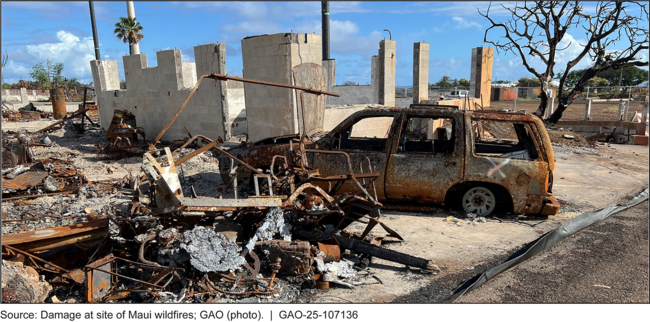Disaster Contracting: Opportunities Exist for FEMA to Improve Oversight
Fast Facts
FEMA—the federal agency that coordinates disaster response and recovery—spends billions annually on contracts to help communities recover. These contracts are mostly for goods (like water) and services (like construction).
FEMA has staff that have been trained and certified to oversee these contracts which helps ensure communities receive their goods and services. For instance, FEMA staff assess contractor reports of work performed and conduct unannounced site inspections.
However, we found that not all FEMA staff performing oversight had the proper training or certification.
Our 7 recommendations address this issue and more.
Damage to Structures from Maui Wildfires

Highlights
What GAO Found
U.S. states and territories have experienced several devastating and costly natural disasters requiring aid from the Federal Emergency Management Agency (FEMA). From fiscal years 2018 through 2023, FEMA obligated more than $10 billion on contracts—mostly for services, such as housing inspections—to conduct response and recovery efforts. Three disasters in that time frame include the Kentucky floods, Hurricane Ian, and the Maui wildfires. Contract obligations for these disasters totaled more than $1 billion.
Maui Wildfires Damage

GAO reviewed 15 contracts from the three disasters and found that FEMA took oversight steps, such as assessing contractor reports of work performed and conducting site inspections. However, FEMA did not always document oversight activities or details of contractor performance, such as whether a contractor performed work within the time frame specified in the contract. Without this documentation, FEMA and others may not know whether FEMA received the level and quality of services or goods that it purchased.
Additionally, some FEMA staff performed oversight without the required authorization or certification, which is not in accordance with Department of Homeland Security (DHS) guidance or FEMA policy. For example, some FEMA housing specialists conducted activities like filling out contactor assessment forms without having received certification or authorization for performing such tasks. Without FEMA identifying who across the agency is currently performing contract oversight duties and ensuring they are appropriately certified and authorized, there is increased risk that FEMA has unqualified staff performing contract oversight. These staff may not properly assess the goods and services received in accordance with the contract.
FEMA uses DHS's staffing model to identify certain contract oversight staff needs. This model, however, does not fully adhere to staffing model key principles. For instance, the model does not incorporate risk factors, such as attrition. Doing so would better position FEMA to retain the staff it needs.
Why GAO Did This Study
FEMA obligates billions of dollars annually on contracts to respond to natural disasters. These include contracts for providing temporary housing to those affected by disasters.
GAO was asked to review FEMA's use and oversight of its disaster contracts. This report examines (1) how and to what extent FEMA used contracts to support its response and recovery efforts from fiscal years 2018 through 2023; (2) steps FEMA took to provide oversight of contractor performance; and (3) the extent to which FEMA identified contract oversight staffing needs, among others.
GAO analyzed contracting data on FEMA's obligations. GAO selected a nongeneralizable sample of 15 contracts and orders across three disasters. At the time of selection, 12 selected contracts accounted for 42 percent of total contract obligations across the three disasters. GAO subsequently selected three additional contracts to review ongoing oversight activities. GAO also reviewed training and staffing documents, conducted site visits to observe contract performance and oversight activities, and interviewed agency officials.
Recommendations
GAO is making seven recommendations, including that FEMA reiterates to oversight staff the importance of documenting contractor performance and takes steps to ensure those performing oversight duties have proper certification and authorization; and that DHS incorporates potential risks into its staffing model. DHS and FEMA concurred with the recommendations.
Recommendations for Executive Action
| Agency Affected | Recommendation | Status |
|---|---|---|
| Federal Emergency Management Agency | The FEMA Administrator should ensure that its Office of the Chief Component Procurement Officer reiterates to contracting officers and CORs, such as through a memorandum or training, the preference for and purpose of implementing performance-based acquisition methods for service contracts. (Recommendation 1) |
FEMA concurred with our recommendation. In May 2025, FEMA's Office of the Chief Component Procurement Officer conducted a performance-based acquisition training session for FEMA contracting officers and contract specialists. The class focused on the definition of performance-based contracting and the use of oversight tools. According to FEMA officials, approximately 170 people attended this training, and FEMA posted a recording of the presentation to its intranet. In August 2025, FEMA's Office of the Chief Component Procurement Officer developed a fact sheet on performance-based acquisitions, emailed it to its Contracting Officer's Representatives, and posted it on the agency's intranet.
|
| Federal Emergency Management Agency | The FEMA Administrator should ensure that its Office of the Chief Component Procurement Officer reiterates to CORs, such as through a memorandum or training, the COR's role in documenting oversight activities taken to ensure contractor performance on service contracts. (Recommendation 2) |
FEMA concurred with our recommendation. In August 2025, FEMA's Office of the Chief Component Procurement Officer issued a fact sheet on contract oversight and documentation responsibilities for Contracting Officer's Representatives. The fact sheet outlines Contracting Officer's Representative responsibilities in ensuring timely and accurate contractor performance assessments as well as on using the DHS Contracting Officer's Representative File Checklist to create and maintain the Contracting Officer's Representative working file. The fact sheet also outlines a supervisor's responsibility to ensure that a Contracting Officer's Representative working file is transferred in the event of staff turnover.
|
| Federal Emergency Management Agency | The FEMA Administrator should ensure that its Office of the Chief Component Procurement Officer trains contract oversight staff (including contracting officers, CORs, and program office staff) on DHS and FEMA requirements for technical monitors to have the appropriate level of COR certification and the appropriate authorizations to serve on contracts. (Recommendation 3) |
FEMA concurred with our recommendation. In August 2025, FEMA issued a fact sheet that highlighted the roles, responsibilities, and training/certification requirements for Contracting Officer's Representatives, Alternate Contracting Officer's Representatives, and Technical Monitors, including requirements for technical monitors to have the appropriate level of Contracting Officer's Representative certification and the appropriate authorizations to serve on contracts. Based on the supporting documentation that FEMA provided, it is not clear that key program office staff received the fact sheet. Program office staff are generally responsible for nominating technical monitors, and a key aspect of this recommendation is increasing program office staff awareness of technical monitor nomination, certification, and authorization requirements. FEMA also held a variety of training classes from May 2025 to July 2025, but these classes did not include information on technical monitor nomination, certification, and authorization requirements.
|
| Federal Emergency Management Agency | The FEMA Administrator should ensure that its Office of the Chief Component Procurement Officer take steps to identify who within the agency is performing contract oversight duties on active contracts, and ensure that those individuals have the proper COR certification and contracting officer authorization. (Recommendation 4) |
FEMA concurred with our recommendation. As of August 2025, FEMA identified steps it is taking to make sure Contracting Officer's Representatives currently serving on contracts are appropriately certified and authorized to do so. However, FEMA did not yet identify similar steps underway to identify others within the agency performing contract oversight duties, such as Technical Monitors and those with other titles that are performing such duties (e.g., security managers or manufactured housing specialists). FEMA also did not identify steps to ensure these individuals (Technical Monitors and those with other titles performing contract oversight duties) have the proper Contracting Officer's Representative certification and contracting officer authorization. We will continue to follow up on the status of FEMA's implementation of this recommendation.
|
| Department of Homeland Security | The Secretary of Homeland Security should ensure that its Office of the Chief Procurement Officer documents the steps it used to create and maintain the contracting job series staffing model. (Recommendation 5) |
DHS concurred with our recommendation. As of August 2025, DHS reported actions to address this recommendation are underway, and it anticipates these actions will be completed by the end of January 2026. We will continue to follow up on the status of DHS's implementation of this recommendation.
|
| Department of Homeland Security | The Secretary of Homeland Security should ensure that its Office of the Chief Procurement Officer incorporates potential risks into its contracting job series staffing model. (Recommendation 6) |
DHS concurred with our recommendation. As of August 2025, DHS reported its Office of the Chief Procurement Officer will incorporate potential risks, such as attrition, into the Department's contracting job series staffing model by the end of October 2025. We will continue to follow up on the status of DHS's implementation of this recommendation.
|
| Federal Emergency Management Agency | The FEMA Administrator should ensure its Office of the Chief Component Procurement Officer uses the results of the contracting job series staffing model to help inform long-term workforce planning, to include staff retention. (Recommendation 7) |
FEMA concurred with our recommendation. As of August 2025, FEMA reported actions to address this recommendation are underway. FEMA anticipates completing these actions by December 2025. We will continue to follow up on the status of FEMA's implementation of this recommendation.
|
